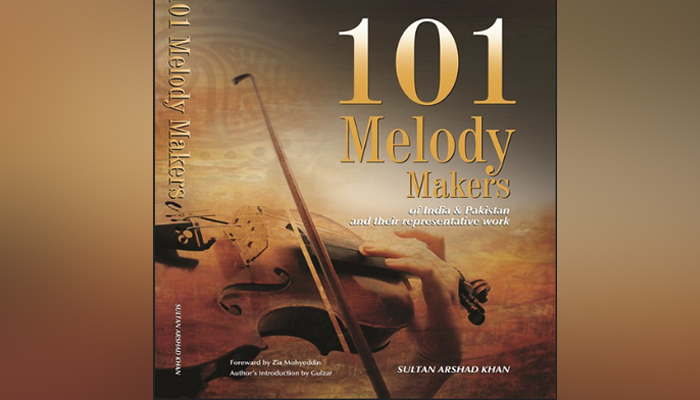Sultan Arshad Khan’s name is synonymous with music history in Pakistan. He is known as the foremost authority when it comes to film music and has dedicated his life to promoting it in the country. A book about the many music composers in India and Pakistan was due from him for a long time, for he had spent time with many of them during the last sixty years. Thankfully, he managed to compile his memories and knowledge in the form of a book and released it last month as ‘101 Melody Makers of India & Pakistan and their representative work’.
The coffee table book might be priced high at Rs. 13,500, but it is for those who prefer quality knowledge over too much and incorrect knowledge. Just look at the names that have written the foreword and the introduction, and you will understand the kind of stuff you will get into, if you purchase the book. The foreword has been penned by Pakistan’s most popular theatre actor legendary Zia Mohyeddin while the Author’s Intro has been done by none other than renowned filmmaker and poet Gulzar, adding weight to the already heavy collection.
What makes this compilation different from the other books in the market about music composers is that it treats them with respect, not as people who came and went after ruling the airwaves. Unlike the other ’Melody Makers of the Subcontinent’ book by Dr. Amjad Parvez, this one deals only with renowned music composers who made melodies for films, and ranks the best 101 but in alphabetical order. Dr. Parvez’s book was more like a recollection of his memories rather than a compilation, whereas this book gives ample space to the 101 Melody Makers it mentions.
From Pakistan’s Khawaja Khursheed Anwar to A. Hameed, Sohail Rana to Robin Ghosh, or India’s SD Burman and RD Burman, every music composer is discussed at length within these pages. When did they begin their careers, who were their most frequent collaborators, what made them click in the first place is followed by a selected songography of each and every music composer. That’s not all, colored posters of the films these music composers were part of as well as memorable pictures from the author’s collection is what stands out in this heavily illustrated collection.
The Composers are also divided into two parts – Part 1 and Part 2, to keep it simple for the readers. You can pick your favorite music composer and start with him, or can start from the beginning with A and end with Z, depending on your choice. Interesting incidents that shaped up these music composers’ careers are mentioned in the narration that takes as much space in the book as do the list of songs/movies composed by the subject.
For a music lover who listens to songs on merit and not differentiates them as old or new, Sultan Arshad’s book comes out as a breath of fresh air. The author didn’t just research and pen his thoughts for the sake of coming up with a book, there’s a method in his madness, a journey behind his accomplishment. Very rarely (or hardly) you come across a mistake within these pages and one must compliment Atlantis Publications for bringing the musical history of the subcontinent films in the form of a guide that will stay relevant for a long time. Why? Because hardly any music composer from the current era is likely to earn a place amongst the Top 101 Melody Makers from India and Pakistan, adding life to this edition, automatically.
If there was no way for you to confirm whether Aisa Bhi Hota Hai was Nisar Bazmi’s debut flick in Pakistan or who was the composer behind Nazrul Islam’s Zindagi, this book would confirm it for you. It also clears many misconceptions about Indian films, and you will have to read it to know it. After all, credible information is hard to find in the era of Social Media and Wikipedia, and a lot of unverified details are available on the Internet. This book pledges to render such web pages obsolete with the abundance of lesser known facts and details that have reached the author from the subject themselves.
Many anecdotes that you either didn’t know about or didn’t believe make it to these pages, from the personal memories of the author who remains one of the very few Pakistanis who continued to explore film music on both the sides of the Wagah border even after Partition. His personal collection of posters and photographs that make it to this book are not even available in India or in Pakistan, making it a one-of-its-kind kind of a book.
And then there is the list of those who nearly missed the list, but were close enough to their 101 compatriots who made it. This list features many renowned names from both the countries, ranging from Pakistan’s Lal Mohammad – Iqbal to many known film composers in India who couldn’t enter the A list for some reasons. Some of them came, composed and then either vanished or faded away, while many went back to their initial platforms and stayed away from films altogether.
Overall, this book is something every music aficionado should have in his collection, its encyclopedic nature makes it worth your while and money. The ‘Guide to pronunciation of words in Roman English’, as well as the ‘Messages’ from some of the names mentioned in these pages are icing on the cake for both the author, and those who appreciate his efforts to keep film music alive in the region.
He wanted to succeed where his father Abid Quraishi failed, despite being a handsome and confident. After Mirza & Sons and Daur-e-Junoon, the youngster took a liking to the craft and developed it by appearing regularly on TV during the 80s and the 90s, before films finally happened.
“I was quite happy when a few of my films did well at the box office, and I got to perform on some of the famous songs like Khalil Haider’s Kapre Badal Kar in Marvi and Rahat Fateh Ali Khan’s debut song Kisi Roz Milo in Mard Jeenay Nahi Dete. I must mention the veteran director Javaid Fazil who made me switch (back) to TV early in 1997 when films were doing well,” said Quraishi.
The actor shared that it was Fazil who predicted that the next 20 years will be dominated by TV after which Karachi’s film industry will rise, adding that it was “exactly how it happened”.
“I am glad that from Manjdhar I started my career as a TV lead, and the journey has helped me deliver a lot of hits, and receive a lot of love from my fans and well-wishers,” recalled the actor.
Quraishi is one of the few actors around who have been part of the industry since the 1980s, and yet continue to do lead roles in TV dramas. He has managed to survive because of his versatility and ability to play his age, rather than go for something that he can’t pull off.
His character in Loag Kia Kahenge was loved by all, because he played a caring friend, while in Muqaddar and Fitoor, some loved his portrayal, and some didn’t.
“Loag Kia Kahenge was a different experience for me as an actor, I had to play a guy who loses his friend to suicide, and then has to worry about his family after he is gone. Since Aijaz (Aslam) opted to play the character who takes his own life due to difficult circumstances, that worked as a catalyst for me, because whenever I thought of my on-screen departed friend, I used to imagine my best friend Aijaz Aslam instead, and that made me cry a lot on screen,” he revealed.
On the characters played in Muqaddar and Fitoor, he said that the two roles “highlighted the hypocrisy” in present in the Pakistani society, adding that those who took it as as a drama instead of a social commentary appreciated it.
“I had a great time working on the dramas, and although I didn’t know at first that Sardar Saif would die in the former, I agreed with the makers reasoning and agreed to it,” said the actor.
Quraishi didn’t restrict himself to acting only, after more than a dozen years on TV, he divided his time to acting and hosting, something that helped him forge a connection with the audience.
‘I had done stage when I was young, but hosting is a different experience altogether. Not only did it help me connect with my fans, but it also opened my eyes to a lot of things that were previously not known to me. It’s embarrassing to admit but there are a lot of issues in our society that need to be highlighted, but we can’t because of the restrictions on TV,” said the Fitoor actor.
Qureshi said via his morning shows he used to highlight such issues, and on quite a number of occasions him and his team actually helped those in need with the help of philanthropic folks.
“We also developed many real-life stories into TV dramas and highlighted the matter in any way we could, so that people know the difference between right and wrong,” said the 48-year-old.
Live in the present
Currently, Faysal is hosting a game show ‘Khush Raho Pakistan’ on BOL Entertainment which is doing very well. The actor-turned-host feels that nothing can be compared to the adrenaline rush of a live show.
When asked about a few recent incidents that happened on his show, Faysal Quraishi explained that be it a game show or a TV drama, he always tries to keep everything in check otherwise everything will go haywire.
“There are times when things go out of hand but these things happen when you are working in front of the camera. Whenever I am on a set, the producer knows that things will run smoothly as I take it upon myself and ensure everything happens properly. My only issue is that we should be sincere in whatever we do, and we should not take the producer lightly just because he or she isn’t there. If we work with sincerity, we will continually raise the bar, and that will help us in the future,” said the star.
A few years back, Quraishi turned to production and delivered a few hit TV serials especially Baba Jani. It propelled him towards film production and he launched his film Sorry: A Love Story, but it was marred by COVID-19, like most films in Pakistan. However, the actor-producer is confident that once things improve, the production will move ahead, although he can’t say the same about producing for TV.
“It is impossible for an independent producer like me to go after TV channels and ask for my money because that’s against my nature. That’s just one of the many issues a producer faces, and that’s why I decided to continue as an actor until professionalism becomes a norm. Otherwise, I would have become sick from the pressure I was under, for non-payment to a producer means non-payment to the cast and the crew. As for my film, it will be back with a bang and I sincerely hope that all major cinemas are back on track soon, and start doing business like before,” he said.
The actor who recently turned 48 has been in the industry since the 1980s and feels that there is no such thing as the ‘forty-plus dilemma’ if the actor stays fit and looks after himself.
‘People say that once you reach your 40s, offers to do lead roles dry up whereas I believe that with maturity, you get a chance to play mature roles. I have been playing young to old characters for the last fifteen years, against my seniors’ advice, and that has helped me a lot. You can’t play a youngster all your life but as a mature person, you can play around. I reject roles that require me to play a boy because that’s something for the youngsters, but with mature characters in Muqaddar and Loag Kia Kahenge, I can focus more because they are closer to my age and physique. Also, when I do try to do a light character, the audience rejects it most of the time for their expectations are sky high; my advice to them is to let me do some light-hearted character once in a while for I am a human too!”
The future holds the key
With an eye on the future, Quraishi has gone digital and made a name for himself on YouTube. The Bashar Momin actor feels that after launching his YouTube channel, he can try to be himself in front of the camera, and relax for some time in his comfort zone. ‘My YouTube channel – Faysal Quraishi Official – has also helped me connect to the audience in a different way, now I can talk to them whenever I want without being a character, for a change.’
However, he adds that YouTube is not the ultimate solution if we want to move ahead in the digital era.
“We need streaming services like Netflix, Amazon, Apple Plus, etc. in Pakistan if we want to raise the bar. Not just that, we have to protect ourselves from international series that are coming up with mind-blowing stuff, stealing our quality-conscious audience,” he said
Recalling a visit by legendary Indian poet and filmmaker Gulzar, he shared that the Indian star has said that “Pakistan is blessed with stories” it just needs searching.
“Sadly, we can’t cover everything because of the restrictions, but if we have multiple streaming services of our own, we can. The audience of today doesn’t want to be bound to a timeslot, they want to binge-watch at their own convenience, and until and unless we give them that, they will continue to move away from the TV and to streaming services that cater to their requirements,” warned the actor.
He is also not a supporter of the Ban Culture in Pakistan, one that bans a drama first and then asks questions. As a viewer, Quraishi believes that Pakistani dramas are doing everything within their limits to highlight social evils, but restricting them will only hurt their progress.
“In films and TV, the villain is always shown as the one who gets away with everything, until he meets his gruesome end, either at the hands of the leading man, or the leading lady. Our officials must understand that in order to highlight an issue, the writers and directors must first show the issue because without doing that, their efforts will not have the same impact. We have never shown the villain as a victor in our dramas, and we never will but if the banning culture continues, the audience might stop watching TV dramas and that could result in a disaster. We must put aside the negativity within and move ahead so that we can compete with the international market and prove our mettle by correcting social evils,” he said.
And finally, something about Faysal Quraishi’s Hollywood debut flick – Window – where he will share the screen with Hollywood actor Faran Tahir, besides local actors Sami Khan, Hameed Sheikh, and Sohaee Abro.
“Window is something that is closer to my heart, and I did it for two reasons – first, it gave me a chance to explore myself as an actor, and secondly, I couldn’t let go of an opportunity to work with the legendary Faran Tahir who has been representing Pakistan in Hollywood for a long time. He is such a down-to-earth guy that it made me ask him why he has no tantrums like other Hollywood stars. He even told me that I am more like Robert Downey Jr., with whom he shared the screen in Iron Man, because in his words, ‘tum dono kaam ke dauran mastian karte rehte ho’,” he said.
He concluded the interview by saying that working with Hollywood writers and crew helped him learn a lot of things as an actor.
“It was great to work with Ammar Lasani and Kanza Zia who are directing the movie; it is not a typical Hollywood action thriller but something closer to what we term ‘art movie’ in Pakistan. I will be reuniting with Sami Khan after Bashar Momin and trust me, it is nothing like what you have seen before.”







